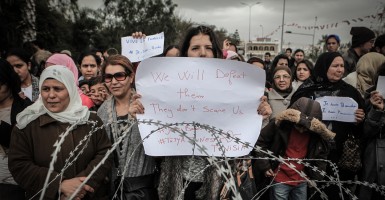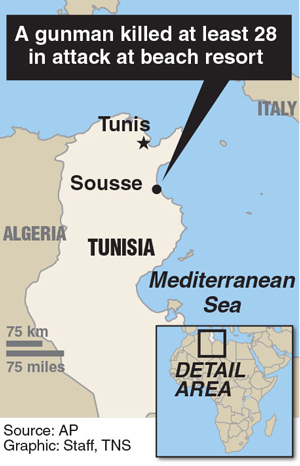For the second time in three months, the North African country of Tunisia has suffered a terrible terrorist attack. According to media reports, multiple gunmen murdered at least 37 people, mostly tourists at a Spanish-owned hotel in the seaside town of Sousse.
No group has claimed responsibility, but the rampage is similar to a March attack by the Islamic State of Iraq and Syria on the Bardo Museum in Tunis that killed 21 tourists. It also comes on the same day as terror attacks in France and Kuwait, the latter of which has been claimed by ISIS.
If ISIS is behind this latest outrage, it suggests Tunisia is becoming a country of focus for the terror group.
Tunisia is a tentative Arab Spring success story as it has held free and fair parliamentary elections since the popular uprising that ousted long-time ruler Zine el-Abidine Ben Ali in 2011.
Late last year, it had its first free presidential election, resulting in a peaceful transfer of power, and has adopted one of the most progressive constitutions in the Arab world. ISIS views any system of governance other than its own authoritarianism as a heretical innovation. Democracy, with its roots in the West, is especially distasteful.
Tunisia also is relatively easy for ISIS to strike as it has networks within the country thanks to at least one training camp it has in the Tunisian desert. There also are an estimated 3,000 Tunisians—more than any other nationality—currently fighting for it and other Middle East terror groups.
Tunisia appears to be in the crosshairs of a brutal common enemy, which alone should prompt increased U.S. support. But the need increases after this attack, which will further damage the already struggling tourism sector that is so important to the Tunisian economy. Tourism only recently had begun to recover from the tumult of the Arab Spring when the Bardo Museum massacre sent it into another tailspin. This attack will exacerbate the problem, which likely is among the reasons, along with the opportunity to kill Westerners, the hotel was chosen as a target.
Tunisia is a fragile democracy in a region that sorely needs democratic examples, and it almost certainly has not suffered for the last time at the hands of ISIS.
The United States should increase its commitment to the country and urge others to do the same, with a robust package of economic and military assistance designed to facilitate Tunisia’s efforts to grow into a resilient and mature democracy. This is both within the United States’ strategic interest and a way to simultaneously strike a blow against ISIS while supporting an ally again suffering a painful wound.































